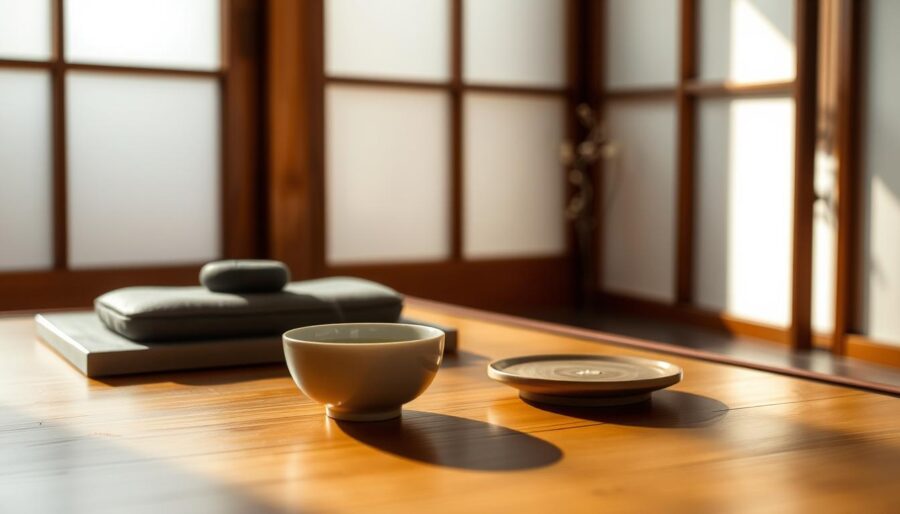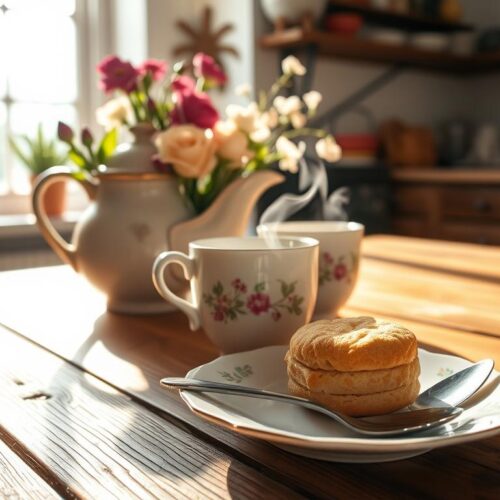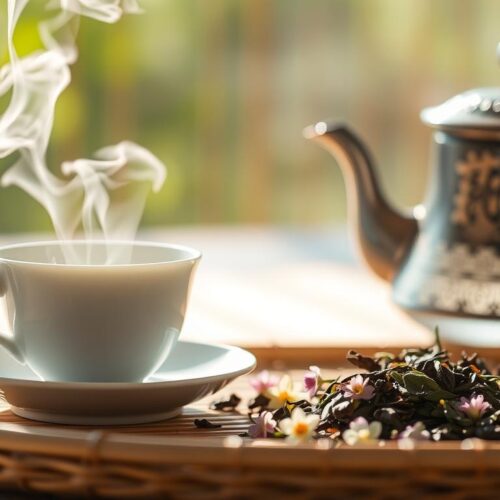Tea is more than just a popular drink; it’s a tradition that goes back centuries. It is enjoyed worldwide, with 3 billion cups drunk each day. The process from the Camellia sinensis plant to your cup is a practice rooted in meditation and mindfulness. Tea comes in many forms like white, green, black, and red. Each type is appreciated for its taste and its ability to help with mindfulness.
Tea offers health benefits, including helping with weight loss and heart health. But it’s also core to the Zen tea culture. It helps people find peace in today’s busy world. The Tao of Chinese Tea shows us how making and drinking tea is a spiritual activity. It helps us find clarity and focus. In our distracting world, tea gives us a moment to stop, breathe, and be mindful. It’s a key part of our daily lives.
Understanding the Connection Between Tea and Meditation
The link between tea and meditation is old, especially in Asia. A 12th-century Japanese monk, Eisai Zenji, played a key role. He brought tea, particularly green tea, to Japan. Green tea is known to help with focus during meditation. This shows the core of Japanese Zen culture. Zen tea, especially matcha, is used in ceremonies to increase mindfulness and presence.
Tea became vital in Buddhist practices over time. Monks used tea to help them focus. This let them meditate longer without getting sidetracked. “Sado,” or the way of tea, teaches us the value of the tea-making ritual. This practice is like a moving meditation. It shows grace and purpose beyond everyday tasks. So, making and enjoying tea becomes a key part of meditation.
The Benefits of Tea in Mindfulness and Meditation
Tea blends perfectly with mindfulness and meditation. Its calming effects help lower stress, crucial for a good meditation session. Green tea, in particular, has L-theanine. This amino acid aids in achieving a focused calm, keeping you concentrated during meditation.
Adding tea to your daily habits boosts both meditation and health. Green tea, loaded with antioxidants called catechins, strengthens immunity and health. This mix of mental focus and physical strength supports your journey to self-awareness and balance. Tea’s cultural history also makes it a powerful tool for mindfulness, connecting you to traditions.
| Benefit | Description |
|---|---|
| Relaxation | Reduces stress and promotes a peaceful state of mind, enhancing meditation quality. |
| Cognitive Clarity | Improves focus and mental clarity, allowing for deeper meditation experiences. |
| Physical Health | Rich in catechins, green tea boosts immunity and supports overall wellness. |
| Emotional Balance | Helps cultivate self-awareness and emotional regulation through regular consumption. |
Choosing the Right Tea for Meditation
Picking the right tea for meditation can greatly improve your focus and relaxation. Green tea, especially matcha, is a top pick due to its vibrant taste and health benefits. It helps you stay calm and concentrated, perfect for meditation.
White tea and herbal teas are also great choices. Herbal teas, like chamomile and peppermint, are known for their ability to ease the mind. Knowing the different traits of each tea type helps you match your tea to your meditation goals.
Here is a comparison of different teas suitable for your meditation practice:
| Tea Type | Flavor Profile | Benefits |
|---|---|---|
| Green Tea | Grassy, umami | Calm focus, antioxidants |
| Matcha | Rich, creamy | Increased energy, high nutrients |
| White Tea | Delicate, floral | Rich in antioxidants, soothing |
| Herbal Tea | Varies widely | Relaxation, digestive aid |
Choosing a specific tea helps deepen your mindfulness during meditation. The right tea will boost your focus without any distractions. This makes your meditation more meaningful.
The Ritual of Tea Preparation
Preparing tea is more than just a task; it’s a ritual that brings mindfulness. By focusing on every step, from boiling water to picking your favorite leaves, we find moments of clarity. Every action, like watching steam rise, helps us be fully present.
The 70/30 rule for filling your teacup mixes the right amount of liquid and air. This method teaches us to appreciate our tea and be conscious of our actions. Mindful drinking lets us enjoy the visual beauty of tea, its soothing sounds, and rich scent. It brings calmness and sharpens our focus.
View each part of tea preparation as a meditation. Enjoying your tea can awaken your senses and bring peace. Making these mindful steps part of your day puts you on a path filled with clarity. Tea becomes a vehicle for calm and mindfulness.
Incorporating Tea into Your Meditation Practice
To make tea a part of your meditation, first create a peaceful space. Begin with a moment to focus on your breathing, helping your mind become calm. When you start to make the tea, think of it as a mindfulness exercise. Measuring, brewing, and pouring the tea helps you stay focused on the now.
Using your senses during tea meditation makes you more aware. Enjoy the smell as the steam rises. Watch how the tea changes color as it steeps. These steps help you connect more with the tea and the moment.
Connecting your breathing with your tea drinking enhances mindfulness. Drinking slowly lets you fully enjoy each flavor and texture. This method combines tea and meditation, deepening your mindfulness journey.
Flavor Profiles: Enhancing the Meditation Experience
The flavors of different teas can greatly impact your meditation. Each one comes with its own smells and tastes. These can make you more aware of the here and now. Enjoying these details helps you focus deeper during meditation.
Take green tea. Its fresh taste might perk you up. On the other hand, the gentle scent of oolong tea can calm your mind. These flavors match how you’re feeling, making meditation better. Exploring these tastes helps you feel thankful and connected, boosting your meditation and overall mindfulness.
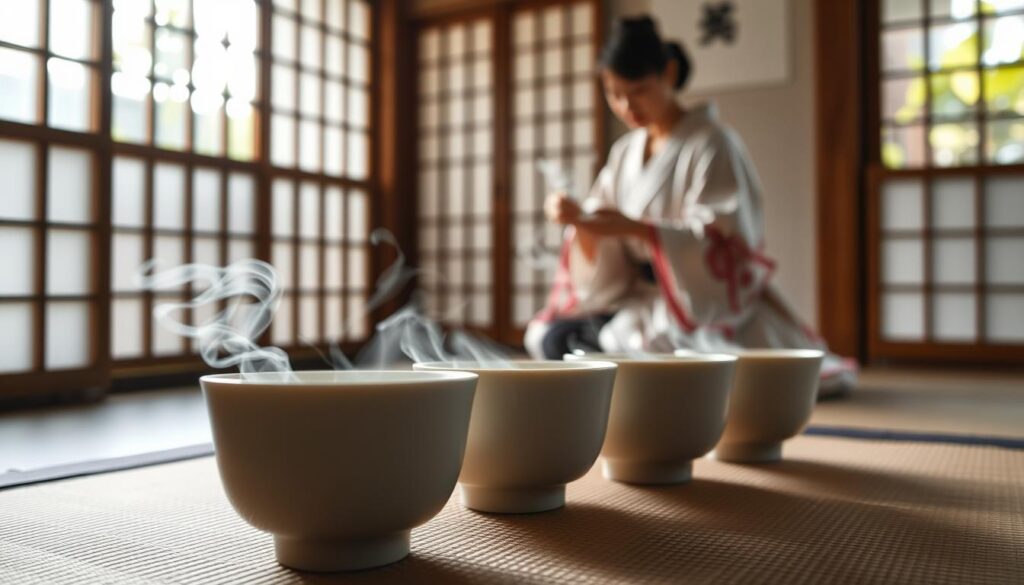
Mindful Drinking: The Art of Savoring
Mindful drinking makes your tea time special. Every sip is a chance for more awareness and joy. It turns drinking tea into a peaceful practice, helping you focus on the moment.
Start by feeling the warmth of your cup. Take a deep breath of its sweet smell. Notice the blend of tastes as you drink slowly. This careful attention links you closer to your tea and the present.
Try drinking slowly to think and enjoy each moment. This helps you relax and be more aware in life. Pouring and sipping tea mindfully teaches you to live in the now.
Group Meditations with Tea
Group meditations with tea can make your mindfulness journey better. Sharing tea in a group creates a strong sense of community. It helps people connect through the careful steps of making and drinking tea. From classic tea ceremonies to relaxed get-togethers focused on enjoying tea and meditation, these activities bring about a deep sense of mindfulness.
When meditating in a group, everyone can share their thoughts and what they’ve learned. This enriches your understanding of both tea and meditation. You experience being mindful on your own and with others at the same time. Group meditation, combined with the calm that tea brings, invites a deep connection to each moment.
- Traditional tea ceremonies that highlight ritual and reflection.
- Outdoor meditation times with herbal teas.
- Indoor meets focusing on different teas while meditating.
- Workshops pairing tea tasting and mindfulness guidance.
Whether you’re looking for community or to grow personally, group tea meditations are great. They blend tea and mindfulness, creating a space where working together and thinking deeply flourish.
| Type of Group Meditation | Focus | Benefits |
|---|---|---|
| Traditional tea ceremony | Ritual and tranquility | Enhances mindfulness and presence |
| Outdoor tea meditation | Nature connection | Boosts relaxation and awareness |
| Indoor tea gathering | Variety exploration | Encourages sharing and learning |
| Mindfulness workshops | Guided practices | Strengthens focus and community |
Tea and Modern Mindfulness Practices
In our busy world, using tea as part of mindfulness activities offers us a chance to find calm. It lets us slow down and build a peaceful state of mind, even when life gets crazy. Mindfulness practices teach us to enjoy quiet moments, helping to reduce stress and make us feel better overall.
Tea rituals can really help shift your mindset. Each step in preparing and enjoying your tea invites you to live in the now. By focusing on the tea’s smell or the warmth of your cup, you ground yourself in the moment.
More and more, workshops and retreats combine tea with mindfulness training. These events give people practical ways to include these ancient rituals in their day-to-day lives. They offer a chance to discover the power of tea rituals in finding personal equilibrium and clarity.
Even technology finds its place in tea mindfulness. There are apps dedicated to creating tea rituals that fit your life, reminding you to take moments for yourself. These tools help weave mindfulness into your routine, adding to your quest for peace in a hectic world.
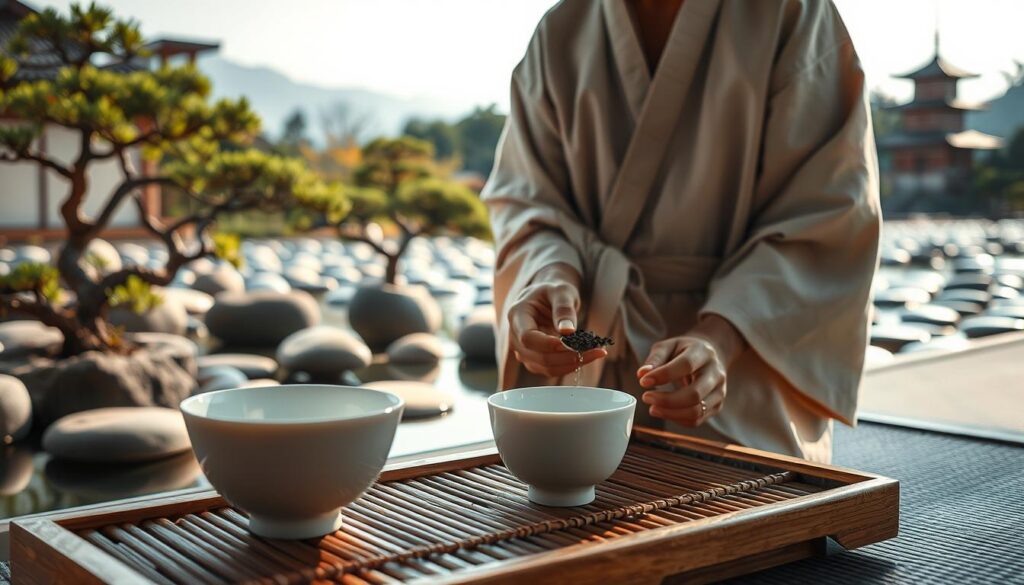
Overcoming Challenges in Tea and Meditation
Starting your journey with tea mindfulness and meditation can bring meditation challenges. You might find distractions, impatience, and confusion on how to combine tea and meditation. But recognizing these hurdles is your first step to overcoming them. This allows you to come up with ways to better your experience.
Having a special space for your tea rituals can change a lot. This peaceful spot can help you focus and connect deeper with your tea and meditation. Also, trying out guided meditations aimed at tea preparation can provide a clear path, making it easier to enjoy both activities together.
Sometimes, discouragement can creep in. A good way to deal with this is to slowly bring mindfulness into your tea drinking. Being kind to yourself and flexible allows you to see each session as an opportunity for growth, no matter how it feels. Every moment you spend in mindfulness with your tea adds to your journey, letting you connect more with the practice.

